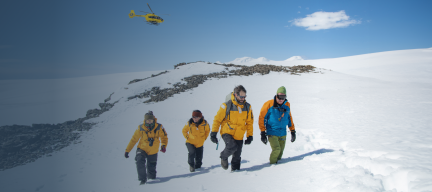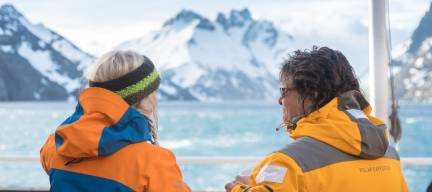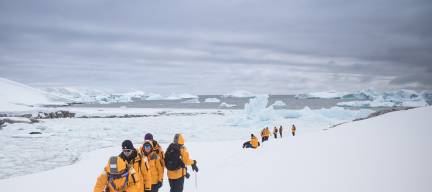Polar adventurers understand the appeal of an icy wilderness that offers up vistas of rugged mountains, frozen rivers, and majestic waterfalls in a beautiful shimmering light. It’s one of the reasons why expeditions to places as remote as Antarctica are in such high demand; at the end of the day, people love a great adventure that tests their mettle.
Antarctica is one of the most beautiful places on the planet. Not only is the main continent an explorer’s white vision in paradise, but there are several amazing islands with their own natural attractions. Trained polar experts expedition team members guide guests through and over remote terrain for the ultimate sightseeing adventure in Antarctica.
When is the best time to go sightseeing in Antarctica?
Antarctica isn’t just an Instagram-worthy destination full of incredible scenery and snow-covered mountain ranges. There’s an incredible amount of wildlife that roams the entire Antarctic peninsula, especially penguins that are most comfortable roaming wild and free on the southern continent.
Penguins can be seen on the Antarctic mainland as well as on nearby islands like Snow Hill Island, King George Island, the South Shetland Islands, and other locations. The best time to go sightseeing in Antarctica to spot penguins in the wild is between the months of February and March. This is the time when penguins will begin their mating rituals and females will lay their eggs near the shoreline so that the next generation of penguins can hatch the following season.
How to plan for sightseeing in Antarctica

A common sight in Antarctica: Adelie penguins marching (or waddling) toward the ocean. Photo: David Merron
Antarctica experiences some of the coldest temperatures on Earth. Rest assured, your expedition team will ensure you have an amazing time, but you do want to be prepared for every kind of weather. That’s why we’ve created this Antarctic packing list with tips on the type of clothing, equipment, and other protective gear you should include in your travel itinerary when preparing for a voyage through Antarctica.
Tips on sightseeing in Antarctica
One of the things you’ll want to do on a trip to Antarctica is to immerse yourself completely in the polar landscape, to connect with the ice, the shores, the wildlife, and the rugged coastlines. You’re here to experience the stunning 7th Continent up close, not from the deck of a ship. So take advantage of every opportunity the Quark Expeditions team offers you, whether it’s to go on a Zodiac cruise to view icebergs or whales, to participate on a shore excursion to see rookeries of tens of thousands of penguins gathered all in one spot.
Our trained travel guides will lead you on fantastic Zodiac cruises throughout the waterways and island channels across the Southern Ocean. You’ll have a chance to witness icebergs and glaciers up close on your Zodiac cruise. Plus, our expedition team members are expert glaciologists, penguinologist, biologists, and polar historians, all of whom can educate you on all aspects of your polar adventure.
Make sure you also bring high-powered binoculars or a portable telescope so that you can do some bird watching in Antarctica. In addition to penguins, you may spot the occasional albatross flying overhead while you explore the land. Albatross can remain airborne for hours as they hunt and swoop down for small prey on the ground near the shoreline of the ocean. You may be able to capture a rarely seen photographic moment!
5 amazing sightseeing attractions in Antarctica
Now, what are some of the most amazing attractions to see in Antarctica? These suggestions will help you plan your own expeditions for a voyage to remember!
The Drake Passage
The Drake Passage is one of the rites of passage for any Antarctic adventurer. This 800-km waterway stretches between the Antarctic mainland and the foot of South America and can be one of the most challenging bodies of water to navigate. For that reason, there is an option to join a voyage such as Antarctic Express: Fly The Drake that allows you to fly over the Drake Passage and land on King George Island. From there, you’ll board a vessel to explore the Antarctic mainland in earnest.
South Shetland Islands
The South Shetland Islands are one of the common stops en route to the main Antarctic mainland. They’re one of the highlights on the Crossing the Circle: Southern Expedition voyage, which is a 14-day adventure that eventually guides you across the Antarctic Circle itself. The South Shetland Islands are part of the travel itinerary for Day 5 of your adventure where you’ll have a chance to see rare birds, including Emperor Penguins, as well as seals and, if you’re lucky, the occasional whale pod!
South Georgia Island
Like South Shetland, South Georgia Island is another common stop on the journey towards mainland Antarctica. There’s a special voyage you can take called South Georgia and Antarctic Peninsula: Penguin Safari. As you can guess by the name, this is a special adventure to spot as many types of penguins as you can see while visiting South Georgia and the rest of the peninsula. Your expedition team will help point out the rarely seen King Penguins as well as inquisitive Gentoo, chinstrap, and Adélie penguins.
King George Island

Quark Expeditions guests encounter resident wildlife on a walk in Antarctica. Photo: Quark Expeditions NAME
Another popular island that is the departure point for people who take the Fly The Drake adventure, King George Island is also home to a largely unknown military base in the Southern Ocean. One of our esteemed travel guides had their own personal adventure through Antarctica, which included stops on King George Island. You can read all about that experience in their own documentary travel blog.
Antarctic Peninsula
Of course, for travelers who wish to have the true Antarctic experience, there’s nothing like the Antarctic Peninsula itself. When you reach the shoreline of the main Antarctic continent, you’ll find yourself in awe of the natural beauty and wonder that emanates from the land itself. You’ll get the best opportunity to bear witness to these incredible sights aboard the Antarctic Express: Crossing the Circle, an 11-day journey through the southern continent.
How to get to Antarctica
The best way to get to Antarctica is by sea since this is how you’ll get to see all of the enchanting wonders of the Southern Ocean in an immersive travel adventure. Consider Quark Expeditions’ 13-day Antarctic Explorer: Discovering The 7th Continent plus Cape Horn and Diego Ramirez voyage.

Cape Horn is the southernmost headland of the Tierra del Fuego, a much-celebrated stop on
expeditions to Patagonia. Photo: AdobeStock
This adventure is truly special as you get the chance to stop in Patagonia on the tip of South America with visits to Cape Horn Island and Diego Ramirez Islands on the border of the Tierra del Fuego archipelago and the Southern Ocean itself. After witnessing landmarks in honor of brave explorers who first discovered these islands, you’ll sail further south towards the Antarctic mainland with stops in the South Shetland Islands, Anvers Island, and the Lemaire Channel.
You can join Zodiac cruises and hiking expeditions once you arrive at the Antarctic Peninsula to further explore the remote wonders of the land. You can also spend hours watching for birds flying overhead and playful whale pods swimming in the ocean. The attractions in Antarctica are seemingly endless.









